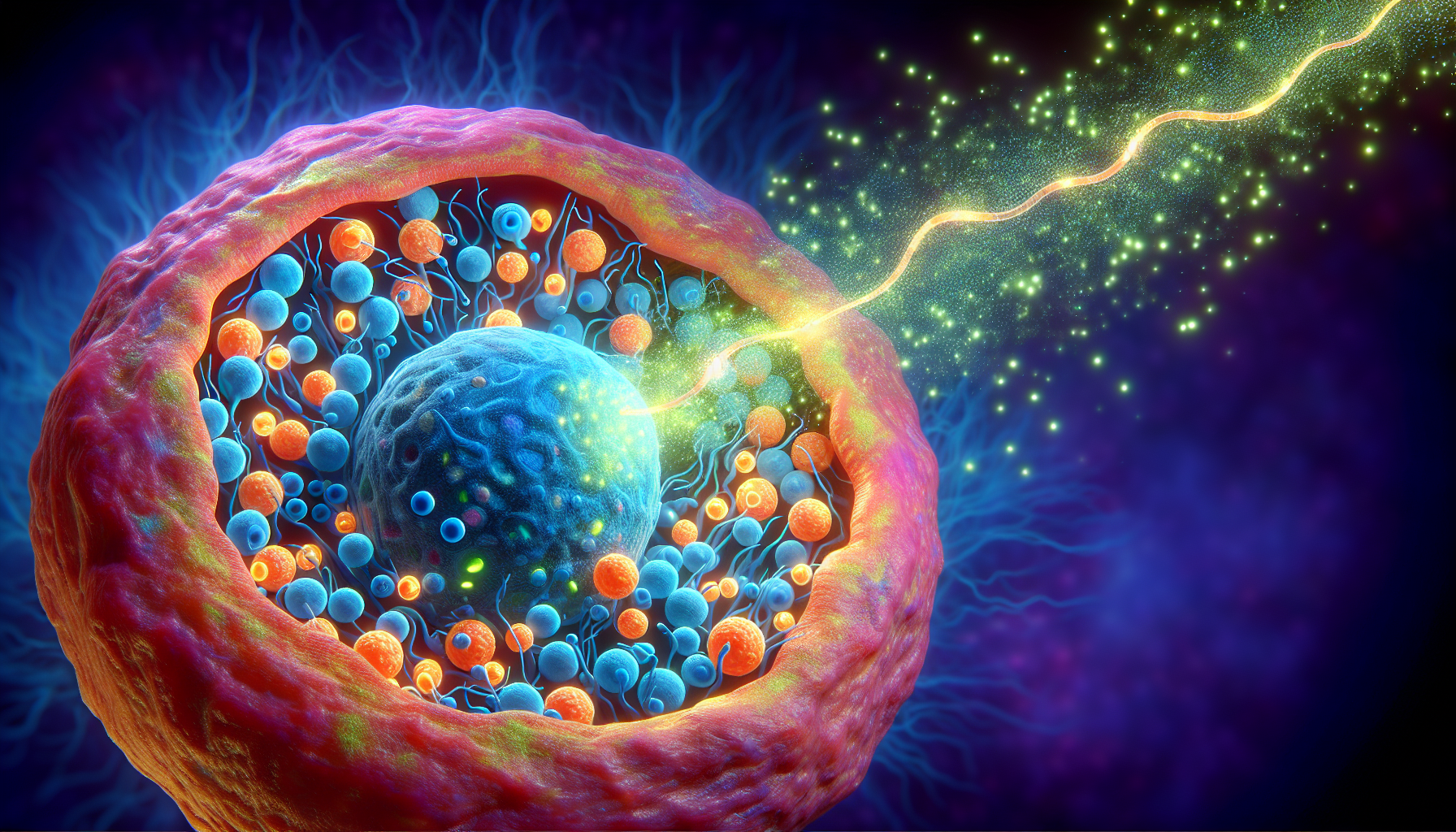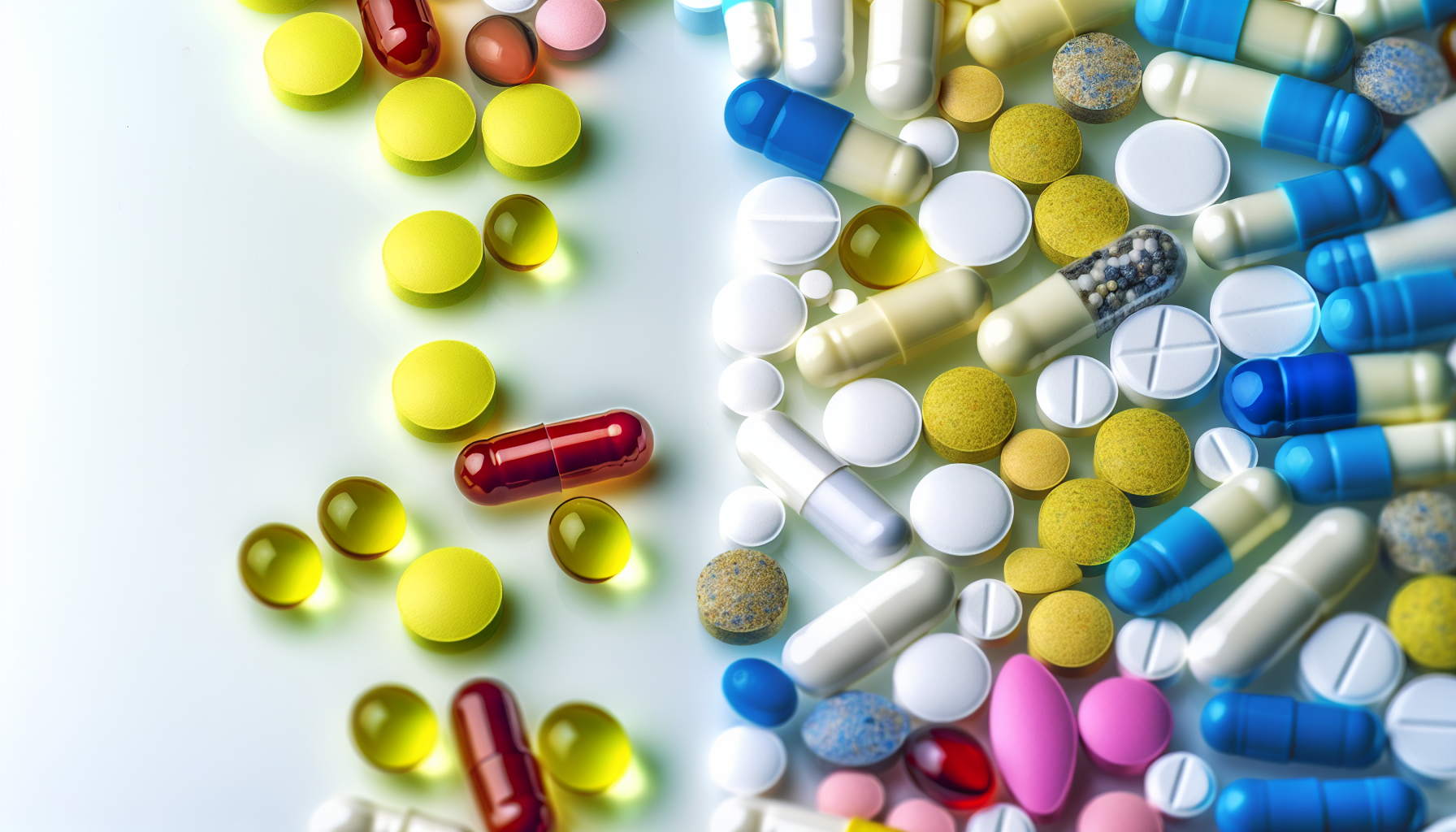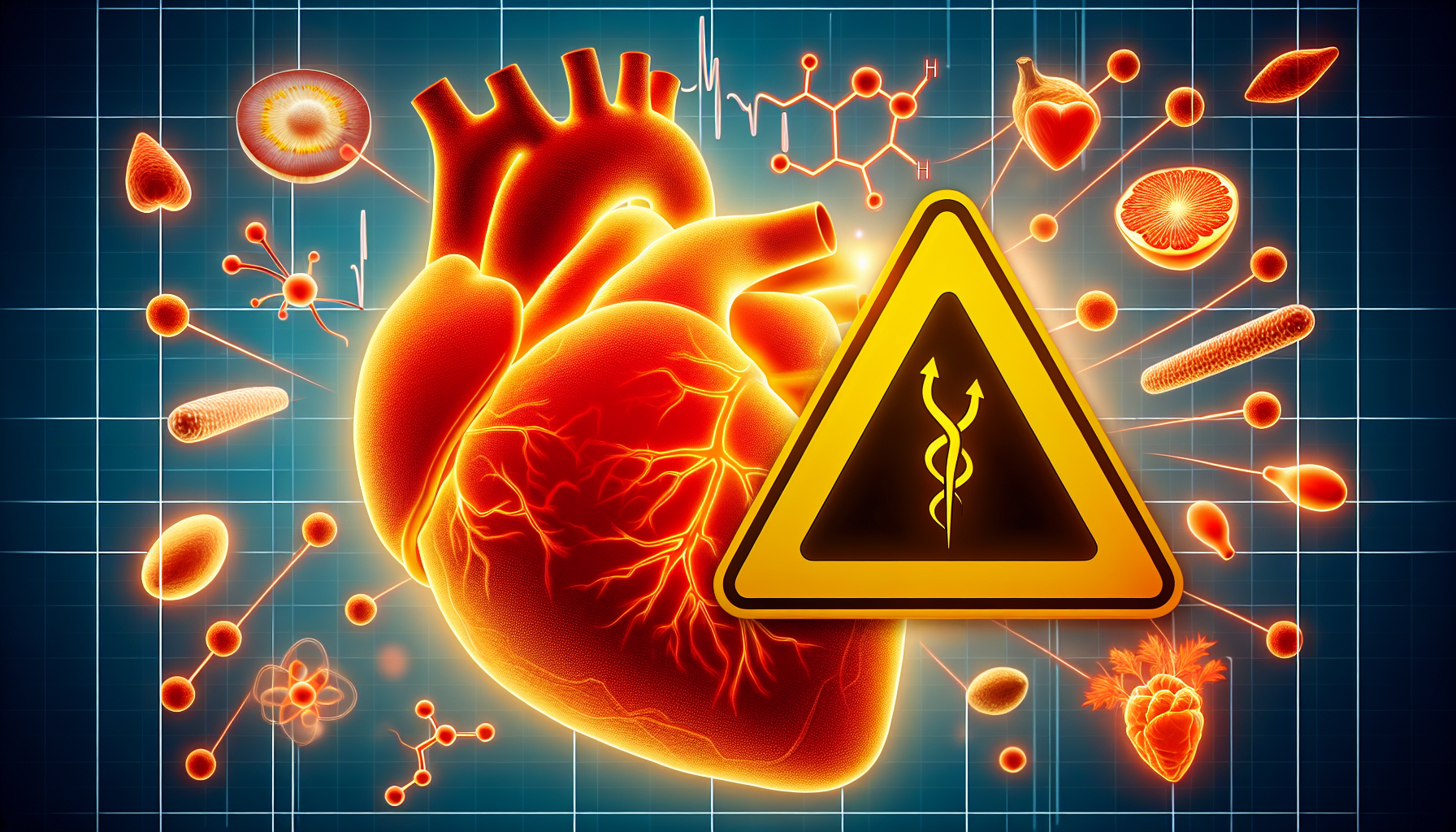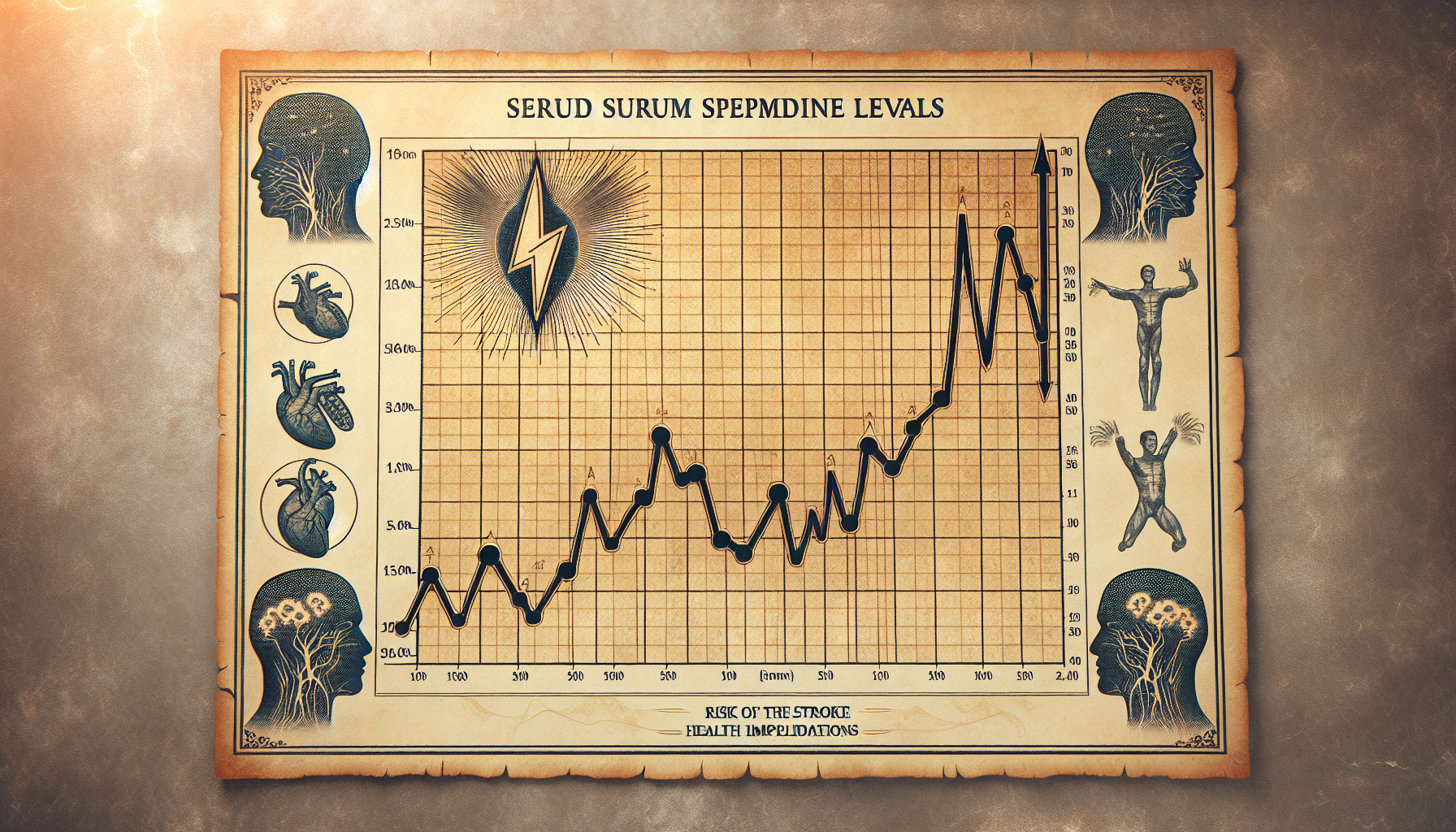Navigating the intriguing world of spermidine supplementation opens up a dialogue on its potential health benefits and the careful considerations accompanying them. This exploration isn't just about adding another supplement to your regimen; it's about understanding how a single compound can transform health and wellness, from extending life to fortifying the heart and mind. Yet, as we dive deeper, the narrative reveals that this promising journey isn't devoid of caution. It invites readers to thoroughly examine spermidine, exploring the scientific evidence to uncover how this compound fits into the complex puzzle of human health. The bottom line is, are there downsides to spermidine?
The enthusiasm surrounding spermidine is grounded in a growing body of research highlighting its role in promoting longevity, enhancing brain function, and offering a shield against various diseases. However, this excitement is tempered with a prudent reminder of the importance of balance and the potential risks that may lurk when tipping the scales. As we chart the course through the benefits, the conversation shifts to critically analyzing what happens when we venture beyond the moderation threshold. This article aims to inform and inspire a holistic approach to health, encouraging readers to consider spermidine supplementation as a part of a broader, well-considered wellness strategy. Join us as we navigate the promises and precautions of spermidine, setting the foundation for an informed and balanced perspective on its place in our lives.
Key Takeaways
- Spermidine supplementation has potential health benefits, including enhanced longevity, improved cardiovascular and brain health, reduced inflammation, and anticancer properties, but it should be balanced with a well-rounded diet.
- While clinical trials have not reported significant side effects or interactions with medications, the potential for adverse effects remains, particularly in populations with specific health conditions, necessitating further research and medical consultation before use.
- Excessive spermidine intake may lead to adverse health outcomes, such as increased stroke risk, highlighting the importance of maintaining physiological levels, whether through supplementation or dietary sources within a holistic health regimen.
Understanding Spermidine Supplementation

Spermidine’s claim to fame in the health industry stems from its potential to slow aging. This is achieved by triggering autophagy, a cellular process that removes waste and supports healthy cell regeneration. Animal studies have shown that spermidine can increase lifespan, thus contributing to its rising popularity in supplements aimed at healthy aging. However, the potential benefits of spermidine supplementation extend beyond longevity. Some other possible benefits of spermidine supplementation include:
- Improved heart health
- Enhanced brain function
- Reduced inflammation
- Protection against liver damage
- Increased resistance to stress
These additional benefits make spermidine a promising compound for overall health and well-being.
Several studies have indicated that spermidine supplementation protects against age-related diseases such as heart disease and dementia, improving cellular fitness across various cell types. Further, it is believed to help limit the development of cancer cells, maintain lipid metabolism, and regulate biological processes like intracellular pH levels and cell membrane potential. This broad mechanistic impact on health underpins the growing interest in spermidine supplements.
Yet, exercising caution is necessary with any supplement. While several studies report spermidine supplementation as safe and well-tolerated, with no known adverse side effects, potential interactions with other medications have not been thoroughly investigated. Thus, it’s prudent to consult a healthcare provider before embarking on spermidine supplementation.
The Rise of Spermidine Supplements
As the quest for longevity and health preservation gains momentum, spermidine supplements have carved out a significant niche within the wellness industry. These supplements, often derived from the nutrient-rich wheat germ, offer a targeted approach to harness spermidine's potential health benefits. With their roots deeply embedded in the science of cellular biology, spermidine supplements are not just another addition to the wellness market; they represent a focused endeavor to combat the ravages of aging and bolster overall health.
Spermidine's role in the body extends far beyond its initial discovery, touching on vital processes that influence cell survival, autophagy, and the body's defense mechanisms against the harmful effects of aging. The choice of wheat germ oil and protein in these supplements is strategic, leveraging their natural spermidine content to deliver:
- Remarkable anti-aging benefits,
- Prevention against the oxidation of lipids,
- Effective inhibition of free radicals,
- Robust protection against inflammation and
- A significant lowering of cholesterol levels.
This multifaceted approach to health enhancement underscores the appeal of spermidine supplements, positioning them as a valuable tool in the arsenal against age-related diseases. However, it is crucial to acknowledge that these supplements are but one piece of the wellness puzzle. A well-balanced diet, rich in spermidine, among other nutrients, remains irreplaceable in its comprehensive health benefits. This dietary approach, combined with regular exercise and effective stress management, embodies the holistic health paradigm, advocating for a lifestyle that nurtures well-being from multiple angles.
Discerning the most effective and reliable products can be daunting for those navigating the burgeoning market of spermidine supplements. Our review article, “What is the Best Spermidine Supplement? A Review of the Top Brands,” aims to simplify this journey. By evaluating five of the top spermidine supplements available, we provide insights into their efficacy, quality, and value, guiding readers toward making an informed choice that aligns with their health objectives. You can check that article here.👇
This exploration into spermidine supplements, enriched with practical guidance and a commitment to holistic health, offers a comprehensive view of how these supplements fit into a broader wellness strategy, emphasizing the synergy between targeted supplementation and lifestyle choices in achieving optimal health.
Spermidine's Mechanism of Action
Comprehending the molecular mechanism driving spermidine’s health benefits is critical to fully understanding its potential. The key to spermidine’s ability to promote longevity lies in its capacity to induce autophagy, a cell maintenance process that breaks down and disposes of damaged or defective mitochondria. This mechanism has been confirmed in various organisms, from mouse liver cells to flies, indicating its broad applicability.
In more technical terms, spermidine induces autophagy by inhibiting the acetyltransferase activity of EP300. This reveals the pathway through which cellular rejuvenation and stress adaptation is facilitated. Activation of autophagy contributes to the turnover of cytoplasmic structures and organelles, which is vital to maintaining cell fitness and preventing age-related cellular deterioration. Yet, bear in mind that overuse or misuse of spermidine might interfere with regular metabolic processes.
Spermidine plays a significant role in essential cell functions such as:
- growth and proliferation
- maintaining genomic DNA stability
- impacting mitochondrial function and lifespan
- facilitating the removal of small chemical groups (acyl groups) from proteins in the mitochondria
- influencing DNA stability
- influencing the growth of cancer cells.
The anticancer properties of spermidine include:
- Interfering with the tumor cell cycle
- Inhibiting tumor cell proliferation
- Suppressing tumor growth
- Inducing autophagy in cancer cells, which improves anticancer immunosurveillance
These properties reduce risks associated with forms of cancer such as hepatocellular carcinoma and colorectal cancer. However, further research is needed to fully understand the complex mechanisms and long-term effects of spermidine supplementation on cancer.
Potential Adverse Effects of Spermidine

Despite the promising benefits of spermidine supplementation, understanding potential drawbacks is essential. Clinical trials reported no significant side effects, even with participants consuming 3.3 mg and 1.9 mg of spermidine for over 3 months. Still, this doesn’t eliminate the possibility of adverse effects in the general population, especially those with a history of food allergies due to allergen risks in spermidine supplements.
Although the trials did not report any significant interactions with medications, it’s important to note that these studies were likely limited in scope, with most participants being relatively healthy adults. Individuals with existing health conditions or those on medication should consult a healthcare professional before starting spermidine supplementation.
Further studies are needed to explore the potential for interactions between spermidine and pharmaceuticals. The necessity for such studies is underscored by the fact that the use of dietary supplements has increased significantly over the years, and the potential for interactions between supplements and pharmaceuticals is a growing concern. In the meantime, a cautious approach to spermidine supplementation is advised.
Surveying Clinical Trials
Clinical trials offer valuable insights into spermidine supplementation's safety and potential side effects. No significant side effects were reported during a double-masked, placebo-controlled trial conducted in Germany from January 2017 to May 2020. Participants were randomly assigned to receive either spermidine-rich supplements or a placebo for 12 months. The trial collected comprehensive data, including:
- demographic data
- smoking status
- alcohol use
- antihypertensive medications
- medical history
Interestingly, pregnant and breastfeeding women were excluded from the trial. This highlights a demographic that should avoid spermidine supplementation due to safety concerns. If you fall into this category, it’s recommended to consult with a healthcare provider before considering any form of supplementation.
While the trial did not report significant interactions with medications, it did face challenges such as the inability to collect several plasma, saliva, and blood samples and minor time deviations in sample collection. These factors underscore the need for more extensive research to fully understand spermidine supplementation's potential risks and benefits.
Reactive Oxygen Species and Spermidine
One of the potential risks associated with spermidine supplementation lies in its interaction with reactive oxygen species (ROS). Reactive oxygen species are chemically reactive molecules crucial in cell signaling and homeostasis. However, when overproduced, they can cause oxidative stress, a cellular imbalance leading to cell damage.
Spermidine supplementation has been investigated for its potential to mitigate oxidative stress. Studies using granulosa cells, macrophages, and zebrafish found that spermidine enhanced protective effects against oxidative stress by activating autophagy and inhibiting inflammation. Moreover, spermidine’s activation of autophagy has been associated with reduced oxidative stress and inhibited apoptosis in cancer cells.
Yet, it has also been discovered that spermidine and polyamine analogs can trigger the production of reactive oxygen species in specific types of cancer. This suggests that while spermidine has the potential to protect against oxidative stress, it may also contribute to oxidative damage under certain conditions. This underscores the need for a balanced approach to spermidine supplementation and the importance of ongoing research into its potential adverse effects.
Spermidine and Cardiovascular Health

Another crucial aspect of spermidine supplementation is its potential impact on cardiovascular health. Animal studies have shown potential enhancements to cardiovascular health and a reduced risk of heart disease. High dietary intake of spermidine has been associated with improved cardiovascular health and resistance to stress, supporting a protective role against age-related diseases. Furthermore, human research has highlighted that dietary spermidine contributes to cardiovascular protection, is associated with increased survival, and is inversely correlated with incident cardiovascular disease.
However, concerns have been raised about the potential impact of spermidine on blood pressure regulation. Specifically, individuals who experienced a stroke presented higher levels of spermidine compared to their control groups. The association between serum spermidine levels and stroke risk was found to be significant, especially in males and individuals older than 60. These findings highlight the need for further investigation into the potential dangers of high serum spermidine levels.
Despite spermidine's promising potential cardiovascular benefits, considering these possible risks is essential. As with any dietary supplement, consulting with a healthcare provider before starting spermidine supplementation is necessary, especially for individuals with existing cardiovascular conditions.
Systolic Blood Pressure Considerations
One of the potential risks associated with high serum spermidine levels relates to systolic blood pressure. An increase in every 10 nmol/L of serum spermidine was associated with an 11% increase in the risk of stroke. This suggests a significant impact of spermidine on systolic blood pressure.
Individuals who had a stroke during the follow-up period were more likely to have had higher systolic blood pressure, indicating a correlation between elevated systolic blood pressure and stroke events. Blood pressure was measured using a standardized automatic electronic sphygmomanometer, which provided consistent monitoring necessary to establish the relationship between spermidine levels and blood pressure changes.
These findings underscore the importance of monitoring blood pressure when considering spermidine supplementation, particularly for individuals with a history of hypertension or stroke. As always, a consultation with a healthcare provider before starting any new supplement regimen is crucial.
Diastolic Blood Pressure Dynamics
On a more positive note, spermidine supplementation has shown potential benefits regarding diastolic blood pressure. Specifically, spermidine supplementation has been demonstrated to preserve diastolic function by improving myocardial compliance in hypertensive rats. This could potentially protect against the progression of heart failure.
Furthermore, dietary spermidine intake has the potential to delay the onset of salt-induced hypertension and maintain diastolic function through enhanced myocardial compliance. These findings suggest that spermidine could have a protective effect on cardiovascular health, specifically in the context of hypertension and heart failure.
Balancing Spermidine Intake with Diet

While spermidine supplementation offers a handy way to boost spermidine intake, don’t forget that a balanced diet can also substantially contribute to the body’s spermidine reserves. Incorporating spermidine-rich foods into your diet offers a natural way to support cellular renewal without relying solely on supplements.
Several foods are high in spermidine, including:
- Wheat germ, which offers an exceptionally high spermidine content of 24.3mg per 100g
- Cruciferous vegetables, which provide an average of 2.5mg per 100g
- Soybeans, which give an average of 20.7mg per 100g
Nonetheless, considering the overall nutritional profile of these foods is crucial. For instance, while mature cheeses contain nearly 20mg of spermidine per 100g, they are also high in salt and saturated fats.
Balancing spermidine intake through natural dietary sources can enable cellular renewal without solely relying on supplementation. This approach aligns with the dietary approach to longevity and advocates for a balanced, diversified diet as the cornerstone of a healthy lifestyle.
Spermidine-Rich Foods vs. Supplements
When contemplating spermidine intake, comparing the benefits of dietary sources to supplements is valuable. Foods rich in spermidine include:
- Soy products
- Legumes
- Corn
- Whole grains
- Chickpeas
- Green peppers
- Broccoli
- Oranges
- Green tea
- Rice bran
- Fresh green pepper
Consuming these foods provides spermidine and supplies additional nutrients for overall health.
Maintaining spermidine levels through a balanced diet is achievable. Here are some foods that are rich in spermidine:
- Potatoes
- Vegetable sprouts
- Salad
- Pears
- Apples
- Whole grains
The average daily nutritional intake of spermidine in European countries is 10 to 15 mg. This suggests that a diverse, balanced diet can provide ample spermidine, offering a viable alternative to supplementation.
Nonetheless, remember that the spermidine content of foods can fluctuate based on their preparation methods. Opting to consume spermidine-rich foods naturally, such as raw or steamed vegetables, can help preserve essential vitamin content, enhancing their overall health benefits.
The Role of a Balanced Diet in Healthy Aging
A balanced diet plays a crucial role in healthy aging. Spermidine-rich foods such as mangoes, beef, and chicken liver offer spermidine and essential nutrients such as vitamins, minerals, and polyphenols. Consuming these foods can help offset the decline in endogenous spermidine production with age, which is beneficial for healthy aging.
Eating spermidine through a varied diet ensures the intake of multiple essential nutrients, which collectively contribute to health and may amplify the anti-aging effects of spermidine. A varied diet should include:
- Vegetables
- Fruits
- Whole grains
- Proteins
- Low-fat dairy
This type of diet is pivotal to supporting healthy aging and for providing necessary nutrients for vital bodily functions.
Dietary spermidine has been linked to increased lifespan in animal studies due to its ability to enhance resistance to stress and bolster defense against age-related diseases. The physiological spermidine pool in the body is derived from cellular synthesis, microbiota biosynthesis with subsequent absorption, and dietary intake, underscoring the significance of diet in maintaining spermidine levels.
Proper hydration is also an integral part of dietary health, especially for older adults who may have a diminished sense of thirst. Thus, a balanced approach to spermidine intake should consider spermidine-rich foods and supplements and the importance of a varied, nutritious diet and adequate hydration.
Spermidine Concentration: Too Much of a Good Thing?

Even though the potential benefits of spermidine are evident, pondering whether there can be an excess of a good thing is essential. Higher serum spermidine levels have been associated with increased risks of adverse health outcomes, specifically a heightened risk of stroke. Plasma concentration of dietary polyamines reaches a maximum of 10–20 μM after high-dose intake, suggesting a physiological ceiling for optimal blood polyamine concentrations, including spermidine levels, in the body.
Interestingly, spermidine supplementation has been shown to:
- Elevate plasma spermine levels without affecting spermidine levels
- Indicate differential absorption and metabolism of supplemented polyamines
- Suggest a regulatory mechanism that balances spermidine concentration in the body
However, the safety of high-dose spermidine supplements is underexplored, particularly as excessive intake could potentially disrupt kidney function and electrolyte balance.
Hence, while spermidine supplementation can be advantageous, it is vital to approach it with a balanced viewpoint. It’s recommended to consult with a healthcare provider before starting spermidine supplementation, especially for individuals with existing health conditions or those on medication.
Study Cohort Findings on Spermidine Levels
Studies have provided valuable insights into the effects of serum spermidine levels on health outcomes. For instance, a nested case-control design study in a rural Chinese population found a significant association between serum spermidine levels and the incidence of stroke. Higher serum levels of spermidine were linked to a greater probability of adverse effects, suggesting that a hormetic dose-response exists with spermidine.
Furthermore, high-dose spermidine supplementation in healthy adults did not increase spermidine levels in blood plasma and saliva, indicating that dietary sources of spermidine may be more beneficial. This underscores the importance of a balanced diet in maintaining healthy spermidine levels.
While these studies provide valuable insights, it’s important to remember that they represent a small fraction of the total population. Further research is needed to fully understand the potential risks and benefits of spermidine supplementation in diverse populations.
Statistical Analyses on Excessive Spermidine
Statistical analyses provide further insight into the effects of spermidine concentration. Studies have shown no significant differences between spermidine and putrescine plasma concentrations when comparing placebo and spermidine supplementation, hinting at a threshold beyond which additional spermidine does not alter plasma levels.
Spermidine is pre-systemically metabolized into spermine before it enters the systemic circulation, suggesting a potential mechanism regulating spermidine concentration in the body. During spermidine supplementation, there is a significant increase in the area under the curve (AUC) for plasma spermine levels, indicating that conversion to spermine is a possible pathway to balance excess spermidine concentration.
These findings underscore the complexity of spermidine metabolism and its influence on the body. They highlight the importance of understanding the potential effects of excessive spermidine intake and the need for further research.
Interactions and Contraindications
Like any supplement, grasping potential interactions and contraindications is fundamental for safe and effective use. Interactions between spermidine and pharmaceuticals can lead to an increased risk or severity of adverse effects. Some specific interactions to be aware of include:
- Acyclovir
- Amantadine
- Chlorpheniramine
- Choline
- Choline salicylate
These potential interactions emphasize the need for medical guidance before beginning supplementation.
Inhibiting spermidine synthesis can alter the gut microbiome, increasing microbial community richness, a higher Firmicutes/Bacteroidetes ratio, and potentially deteriorating cardiac function. This highlights the importance of considering the broader implications of spermidine supplementation on overall health.
While spermidine supplementation hasn’t reported significant adverse effects, interactions with other medications haven’t been thoroughly investigated, necessitating medical guidance and cautious use. It’s crucial to consult with a healthcare provider before beginning spermidine supplementation to ensure it is safe, considering individual health conditions and current medications.
Understanding Exclusion Criteria
Exclusion criteria in spermidine supplementation studies help ensure valid results and protect the safety of participants. They also highlight populations that should avoid supplementation due to safety concerns. For instance, pregnant and breastfeeding women are often excluded from spermidine supplementation studies, which leads to a lack of safety data for these populations.
Other standard exclusion criteria include individuals with:
- abnormal BMI
- acute diseases
- a history of food allergies
- recent medication or dietary supplement intake
- substance abuse
- pregnancy
- breastfeeding
- shift workers
- those adhering to a vegan diet
In this context, it’s essential to consider inclusion and exclusion criteria when designing a study to ensure a representative sample.
These criteria highlight the need for individualized considerations and medical guidance when considering spermidine supplementation.
While exclusion criteria ensure the integrity and safety of clinical trials, they also underscore the need for further research to understand the potential effects of spermidine supplementation across diverse populations. Until more comprehensive data is available, it’s prudent to consult with a healthcare provider before starting any new supplement regimen.
Drug-Spermidine Interactions
Understanding potential interactions between spermidine and other drugs is crucial for mitigating potential complications. For example, combining spermidine with certain pharmaceuticals can enhance the risk or severity of side effects. These pharmaceuticals include:
- Acyclovir
- Amantadine
- Chlorpheniramine
- Choline
- Choline salicylate
These potential interactions underscore the importance of medical guidance when considering spermidine supplementation, particularly for individuals currently taking other medications. Even if no significant interactions have been reported in studies, the potential for unforeseen complications warrants a cautious approach.
If you’re contemplating starting spermidine supplementation, discussing it with your healthcare provider is crucial. They can provide guidance based on your health status and current medication regimen, helping ensure you can safely enjoy the potential benefits of spermidine supplementation.
The Longevity Paradox: When Anti-Aging Benefits Meet Risks
Even though spermidine supplementation offers promising anti-aging benefits, considering potential risks is crucial. One area of concern is the complex relationship between spermidine and cancer. While spermidine has anticancer properties and can induce autophagy, which can help prevent the onset of oncogenesis by clearing toxic cellular debris, it might also inhibit apoptosis in cancer cells, prolonging their survival.
The role of spermidine/spermine N1-acetyltransferase (SSAT) in polyamine metabolism is significant and a potential diagnostic marker and therapeutic target in cancer. However, this action's exact mechanisms and long-term effects in humans require further research.
These potential risks highlight the complex nature of spermidine and the importance of a balanced approach to supplementation. Despite the possible anti-aging benefits of spermidine, it’s essential to consider potential downsides and seek advice from a healthcare provider before starting supplementation.
Weighing Cancer Risks
While spermidine has potential anticancer properties, it’s essential to understand that the relationship between spermidine and cancer is complex. Spermidine can promote anticancer immunosurveillance and is associated with lowered risks of developing hepatocellular carcinoma and colorectal cancer. However, further research is needed to fully understand the complex mechanisms and long-term effects of spermidine supplementation on cancer.
For instance, spermidine can induce apoptosis in cancer cells through oxidative stress and disruption of mitochondrial membrane potential. However, this may also affect non-cancerous cells. On the other hand, spermidine-induced autophagy is a double-edged sword; it can prevent the onset of oncogenesis by clearing toxic cellular debris, but it might also inhibit apoptosis in cancer cells, prolonging their survival.
Therefore, while the potential anticancer properties of spermidine are promising, adopting a balanced perspective toward spermidine supplementation is crucial. It’s recommended to consult with a healthcare provider before starting spermidine supplementation, especially for individuals with a history of cancer or those at high risk of developing cancer.
Spermidine and Neurodegenerative Disorders
Another interest in spermidine research is its potential role in neurodegenerative disorders. Spermidine has been shown to:
- Improve memory and cognitive function, offering protection against age-related cognitive decline
- Prevent dopaminergic neuronal loss in Parkinson’s disease
- Have the potential to treat neurodegenerative diseases like Alzheimer’s through autophagy activation
However, there are concerns about spermidine’s association with:
- advanced brain aging
- increased stroke risk
- disruptions in the blood-brain barrier
- cytotoxic metabolite generation
These concerns highlight the need for a cautious approach to spermidine supplementation, particularly for individuals with a history of neurodegenerative disorders or those at high risk.
Studies have yet to establish a direct causal link between spermidine supplementation and increased risk of neurodegenerative disorders or stroke. Still, the potential for such risks warrants careful evaluation and further research. As always, a consultation with a healthcare provider before starting any new supplement regimen is crucial.
Holistic Health Perspective
In the field of health and wellness, adopting a holistic view is vital. This means considering all aspects of health, including:
- Diet
- Exercise
- Mental well-being
- Supplements or medications
Spermidine acts similarly to caloric restriction mimetics, inducing biochemical changes that have broad health-promoting effects on the body. However, it should be integrated into a holistic health regimen to fully benefit from spermidine supplementation.
This means considering the dosage and timing of spermidine supplementation and ensuring a balanced diet, regular exercise, and effective stress management. A holistic approach to health acknowledges that all aspects of health are interconnected and that optimal health can’t be achieved through a single intervention or supplement.
While spermidine supplementation offers promising potential for promoting longevity and health, it’s crucial to consider these potential benefits regarding overall health and well-being. As always, it’s recommended to consult with a healthcare provider before starting any new supplementation regimen, including longevity supplements.
Cellular Functions Beyond Longevity
While spermidine is often associated with promoting longevity, it’s important to acknowledge that it impacts various cellular functions beyond this. For instance, a study found that a 30-day intake of spermidine significantly reduced levels of cortisol, a stress hormone, in men. This suggests that spermidine may affect stress response and overall cellular health.
Spermidine also plays a significant role in cellular processes like growth, proliferation, and the stability of genomic DNA. It impacts mitochondrial function and lifespan by facilitating the removal of small chemical groups (acyl groups) from proteins in the mitochondria, thus influencing DNA stability and the growth of cancer cells.
Understanding these broader effects of spermidine can help to inform a more comprehensive approach to supplementation. It’s not just about longevity but about supporting overall cellular health and function. As always, it’s crucial to consider any supplement's broader health implications and consult a healthcare provider before starting supplementation.
Integrating Spermidine into a Holistic Health Regimen
As with any supplement, the key to reaping the benefits of spermidine lies in its careful integration into a holistic health regimen. Engaging in a balanced nutrition plan, mindful spermidine supplementation, and consultation with healthcare professionals for personalized dosing is crucial for safely incorporating spermidine into a holistic health routine.
High-quality spermidine supplements serve as an adjunct to dietary sources, providing standardized doses that enhance overall wellness when paired with regular exercise and effective stress management techniques. Incorporating a spermidine supplement into your routine and persistently tracking health progress and outcomes is essential for evaluating the benefits of spermidine in a long-term wellness strategy and adjusting the regimen as necessary.
Adopting a holistic approach to spermidine supplementation facilitates a more comprehensive understanding of its potential benefits and risks. It’s not just about the supplement itself but about how it fits into an overall lifestyle that promotes health and wellness.
Summarizing Our Discussion on Spermidine
The exploration of spermidine supplementation reveals a realm filled with the potential for enhanced health and extended longevity. At the heart of this discussion is the significant role of spermidine in promoting cellular renewal and autophagy, making it a key topic of interest in the health and wellness community. Yet, this exploration comes with its complexities, marked by the need to consider both the advantages and possible risks carefully. Before incorporating spermidine into one's health plan, consulting with a healthcare provider is crucial to ensure it fits well with individual health conditions and goals.
The allure of spermidine is not without its complexities. While its contributions to cardiovascular health are noteworthy, emerging concerns about its implications for blood pressure regulation and stroke risk necessitate careful examination. Similarly, the dichotomy within its relationship with cancer—balancing between its anticancer potentials and the risks tied to its roles in autophagy and apoptosis—paints a picture of an intricate interplay between benefit and caution.
Adopting a holistic perspective on health, it becomes evident that spermidine supplementation should not stand in isolation but rather be integrated into a comprehensive lifestyle strategy. This strategy should embrace a balanced diet, regular physical activity, and effective stress management techniques, crafting a multifaceted approach to wellness. As we continue to navigate through the layers of spermidine’s potential, the call for further research is clear, aiming to deepen our understanding of its implications across different demographics and those with preexisting health conditions.
For readers intrigued by the intersection of spermidine and aging and the quest for youthful renewal, our previous article, “Can Spermidine Reverse Aging? Examining the Potential for Youthful Renewal,” offers a deep dive into the science behind spermidine’s role in the aging process. This piece serves as a companion read, providing further insights into how spermidine may contribute to a landscape where the vitality of youth meets the wisdom of age. You can check it out here. 👇
Frequently Asked Questions
Does spermidine have adverse effects?
Yes, spermidine may have adverse effects, particularly at high doses, such as an increased risk of stroke in humans. It's essential to be mindful of the dosage when consuming spermidine.
Is it safe to take spermidine?
Yes, it is safe to take spermidine as it is a natural component found in many foods and is well tolerated in the body. There are no known adverse side effects from spermidine supplementation.
Is spermidine hard on the liver?
Spermidine assists liver protection and prevents liver fibrosis and hepatocellular carcinoma by enhancing NRF2 signaling and activating autophagy. Therefore, it is not hard on the liver.
What is spermidine, and how does it work?
Spermidine is a natural polyamine that supports cell renewal, autophagy, and healthy cell regeneration, playing a crucial role in biological processes like cell growth and DNA stability.
Can I get enough spermidine from my diet?
A balanced diet can provide sufficient spermidine intake by including soy products, legumes, corn, whole grains, and green peppers. Consuming these foods regularly can help meet the body's spermidine needs.
Thanks for taking this journey to explore the simple question: "Are there downsides to spermidine?" We hope this discussion has helped clarify the benefits and precautions of this fantastic and ubiquitous molecule. Also, if you want to add to your library of knowledge, you should check out the other articles mentioned and linked above. It never hurts to add to your knowledge arsenal!
Please return soon to check out our next review of another incredible supplement – we’re always looking out for YOU!
*We are NOT qualified medical advisors. The content here is only based on our personal opinions and should NOT be used as a substitute for a healthcare professional's advice!











Member discussion